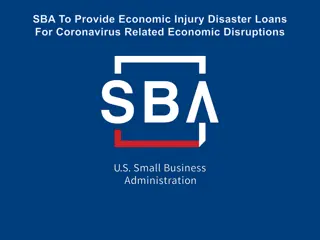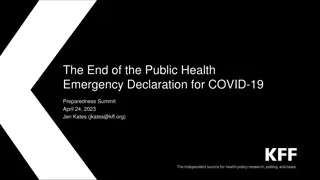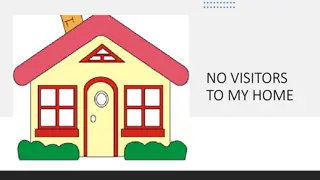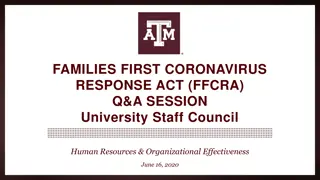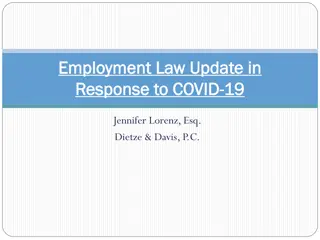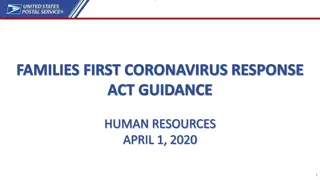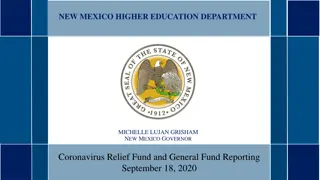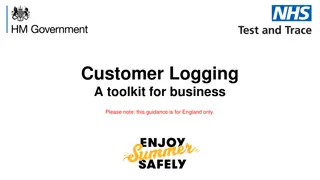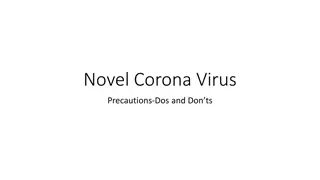Supporting Children in Understanding the Coronavirus
Openly discussing the coronavirus with children is essential to alleviate worries and provide accurate information. Parents should filter news, offer developmentally appropriate responses, and take cues from children's questions. It's crucial to manage parental anxiety, reassure children about the virus's rarity, and focus on safety measures to empower them. This guidance emphasizes the importance of communication and reassurance in helping children navigate the complexities of the pandemic.
Download Presentation

Please find below an Image/Link to download the presentation.
The content on the website is provided AS IS for your information and personal use only. It may not be sold, licensed, or shared on other websites without obtaining consent from the author.If you encounter any issues during the download, it is possible that the publisher has removed the file from their server.
You are allowed to download the files provided on this website for personal or commercial use, subject to the condition that they are used lawfully. All files are the property of their respective owners.
The content on the website is provided AS IS for your information and personal use only. It may not be sold, licensed, or shared on other websites without obtaining consent from the author.
E N D
Presentation Transcript
Most children will have already heard about the virus or seen people wearing face masks, so parents shouldn t avoid talking about it. Not talking about something can actually make kids worry more. Look at the conversation as an opportunity to convey the facts and set the emotional tone. DON T BE AFRAID TO DISCUSS THE CORONAVIRUS
Parents should filter the news before speaking to your child about the coronavirus. Your goal is to help your children feel informed and get fact-based information that is likely more reassuring than whatever they re hearing from their friends or on the news. 3
BE DEVELOPMENTALLY APPROPRIATE Don t volunteer too much information, as this may be overwhelming. It s okay if you can t answer everything; being available to your child is what matters. Instead, try to answer your child s questions. 4
TAKE YOUR CUES FROM YOUR Give them ample opportunit y to ask questions. You want to be prepared to answer (but not prompt) questions Invite your child to tell you anything they may have heard about the coronavirus, and how they feel. Your goal is to avoid encouraging frightening fantasies. CHILD
Deal With Your Own Anxiety When you re feeling most anxious or panicked, that isn t the time to talk to your kids about what s happening with the coronavirus, warns Dr. Domingues. If you notice that you are feeling anxious, take some time to calm down before trying to have a conversation or answer your child s questions.
Be Reassuring Children are very egocentric, so hearing about the coronavirus on the news may be enough to make them seriously worry that they ll catch it. It s helpful to reassure your child about how rare the coronavirus actually is (the flu is much more common) Kids actually seem to have milder symptoms.
Focus On What Youre Doing To Stay Safe One way to reassure kids is to emphasize the safety precautions that you are taking. Kids feel empowered when they know what to do to keep themselves safe. (J. Howard, Child Mind Institute. The CDC recommends thoroughly washing your hands as the primary means of staying healthy.
They are taking care of themselves by washing their hands with soap and water for 20 seconds (or the length of two Happy Birthday songs) when they come in from outside, before they eat, and after blowing their nose, coughing, sneezing or using the bathroom. If kids ask about face masks, explain that the experts at the CDC say they aren t necessary for most people. If kids see people wearing face masks, explain that those people are being extra cautious. 9
STICK TO ROUTINE We don t like uncertainty, so staying rooted in routines and predictability is going to be helpful right now. It is particularly important if your child s school or daycare shuts down. Make sure you are taking care of the basics just like you would during a spring break or summer vacation. Structured days with regular mealtimes and bedtimes are an essential part of keeping kids happy and healthy. 1 0
Tell kids that you will continue to keep them updated as you learn more. Let them know that the lines of communication are going to be open. You can say, Even though we don t have the answers to everything right now, know that once we know more, mom or dad will let you know, too.
Talking to kids about the Coronavirus by Rachel Ehmke


